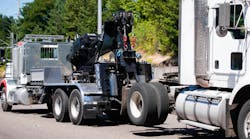Here it is April, and much like the summer movie season that is right around the corner, the regulatory landscape is filled with yet another sequel to an already exhausting series of regulations — new hours of service (HOS) rules are “coming soon.”
After a series of listening sessions focused on the current rules, during which industry officials offered plausible solutions to issues that evolved under the current regulations, the Federal Motor Carrier Safety Administration seems destined to develop regulations that will lead to a lot of hand-wringing in some places. With a series of three imperfect regulations already on the books to go by, I find it hard to believe that a solution will be developed that is sufficient enough to keep these rules from going back to the Court of Appeals.
The listening sessions, convened across the country, proved useful in helping the industry find its voice on HOS and related issues. Sleeper flexibility, the current hours' schedule, detention times at shippers, and truck parking were addressed time and again by carrier safety representatives, industry associations and drivers themselves. Parties in opposition to the current HOS rules, however, have yet to voice an opinion on how to actually fix them. In the absence of a solution, the trucking industry has stepped up to the plate in the hopes of hitting it out of the park.
Flexibility in the sleeper provision was consistently the topic du jour for those commenting. On the heels of achieving its lowest fatality rate in decades, industry officials argued that providing an even greater opportunity to rest through a more flexible sleeper berth provision would aid in further reducing fatigue-related accidents. Drivers should be able to sleep when they are tired.
The second most important discussion topic was often a combination of two — detention times and truck parking — as both force drivers to go off-duty when they are not tired or to drive when they are out of hours. Furthermore, the lack of proper and usable parking for trucks not only makes it more difficult to rest when required, but also forces drivers to find less-than-suitable places to park. These sentiments were echoed throughout the listening sessions and will hopefully challenge the agency to find a cure to this growing problem.
Current provisions, such as 11-hour drive time and 34-hour restart, are essential to maintaining the current operational standing of the industry. If those were to change, many carriers could lose any flexibility that currently exists. Let us not forget that this industry spent millions retooling fleets and restructuring routes after the last change to the HOS regulations.
To say the very least, the industry will soon have a new rule for drivers to drive by, new hours for which they can rest and nap, and, inevitably, a new rule that will draw criticism and fire from someone. As information gathered in the agency's listening sessions is deciphered and interpreted, a new hours of service rule will be promulgated and placed on an industry already operating at safety levels not achieved in decades.
The industry has demonstrated exemplary improvement in its fatality rates. I urge the agency to retain the existing drive time and restart provisions to spare the industry the millions of dollars in costs that it will again incur due to any change.
David Heller, CDS, is director of safety and policy for the Truckload Carriers Assn., responsible for interpreting and communicating industry-related regulations and legislation to the membership of TCA. Send comments to Mr. Heller at [email protected].


